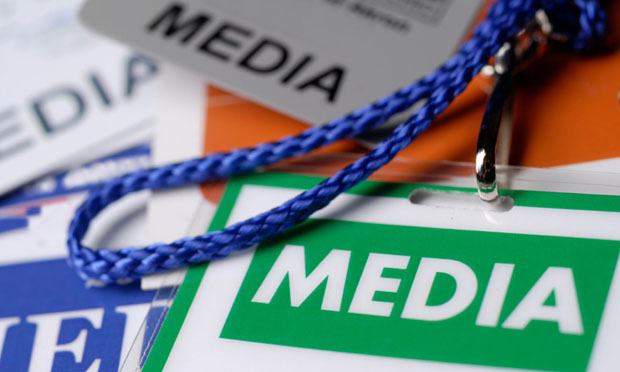The journalism market in the United States is more diverse than ever before, with a wide array of independent newsgatherers complementing the work of institutional news organizations. But regardless of where journalists practice, it is essential to their mission that they have access to information about the activities of government and private organizations. In many cases, laws that grant the public rights of access to government (such as open meetings laws, freedom of information acts, and constitutional rights of access to judicial proceedings) also guarantee that members of the media can obtain information they need.
But when journalists need access to government or private spaces beyond what is allowed to the public at large, they must obtain special permission. This frequently takes the form of a media credential, an official document or statement from an organization that the journalist is permitted to be somewhere or engage in particular activity, regardless of rules applicable to the rest of the public. The issuance of credentials is, however, far less uniformly regulated than other interactions between press and government. Diverse standards imposed by federal, state, local, and private organizations have led to confusion over who should receive media credentials in different contexts, and raised questions about the definitions of journalism used by these organizations.
A 2014 study from the Digital Media Law Project at Harvard’s Berkman Center for Internet & Society and the Journalist’s Resource project at the Harvard Kennedy School’s Shorenstein Center on Media, Politics and Public Policy, “Who Gets a Press Pass? Media Credentialing Practices in the United States,” is the first of its kind to perform a quantitative examination of media credentialing in the United States. It surveys the experience of more than 1,300 newsgatherers of various kinds throughout the country in their efforts to obtain media credentials from different types of credentialing organizations from 2008 to 2013. The authors are Jeffrey Hermes, John Wihbey, Reynol Junco and Osman Tolga Aricak.
The study’s findings include:
- One out of every five respondents who applied for a credential was denied by a credentialing organization at least once.
- Certain categories of applicants are more likely to be denied than others: freelance journalists were significantly less likely to receive media credentials than employed journalists.
- Photographers were more likely to be denied than non-photographers.
- Respondents who identified themselves as activists were more likely to be denied than those respondents who did not.
“The survey results suggest a need for deeper inquiry into the results discussed above,” the authors conclude, “perhaps through a survey of particular credentialing organizations or interviews with journalists who have been granted or denied credentials by these gatekeepers. Further understanding of the points of tension between the journalists who need access and the organizations that control access will allow for more effective attempts to resolve such tension through negotiation, policy making, or legislation.”
Related: For more perspective on this study and its findings, see coverage by the Columbia Journalism Review and the Nieman Journalism Lab.
Keywords: news


Expert Commentary